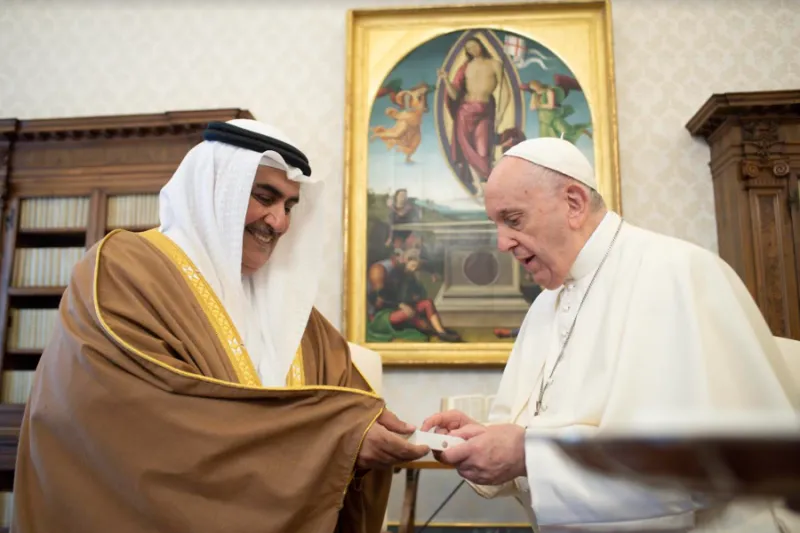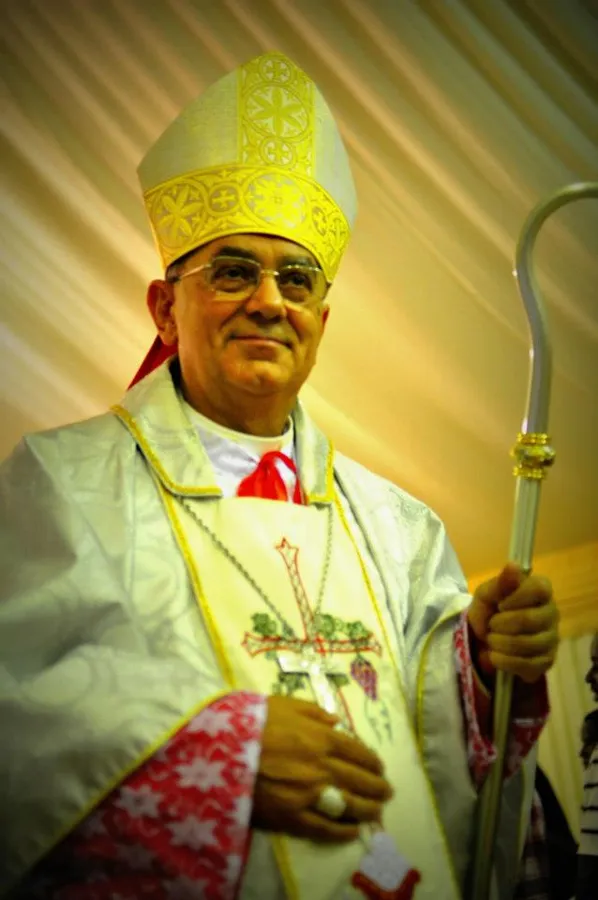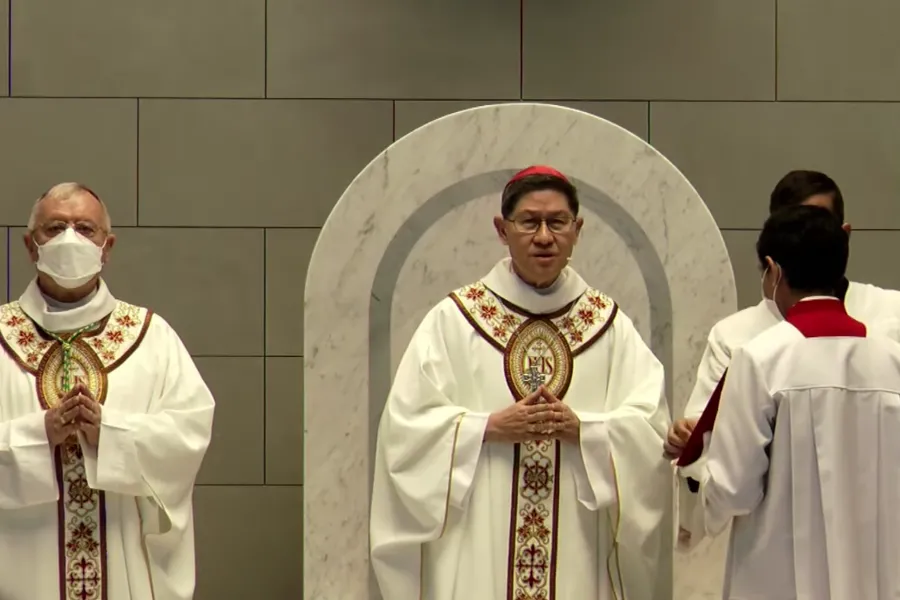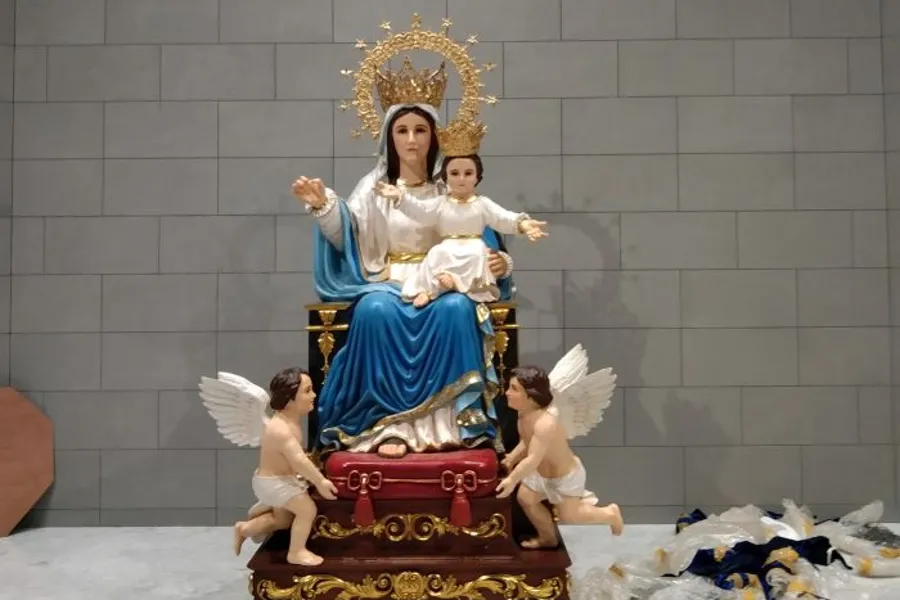
Rome Newsroom, Sep 21, 2022 / 04:53 am (CNA).
Three intertwined stories set the stage for a possible papal trip to the Kingdom of Bahrain in November this year: That of a missionary bishop, a Marian devotion, and a Muslim country open to Christians.
The Cathedral of Our Lady of Arabia was inaugurated on Dec. 10, 2021. It was the dream of a visionary bishop, Camillo Ballin, who died Apr. 12, 2020, after spending about 50 years in Arab countries.
Ballin was behind the ambitious construction of a worship building for 2,300 people, some 12 miles from the Bahraini capital Manama, with the king’s permission, on land donated by the king.

If Pope Francis’ trip to Bahrain will take place in November — the journey is being considered, said the director of the Holy See Press Office Matteo Bruni on his return from Kazakhstan — it will be to visit this cathedral.
In doing so, the pope would also pay homage to the late bishop behind the project.
Pope Francis was invited to Bahrain as early as 2014 but then preferred to go to the United Arab Emirates in 2019 to sign the Declaration for Human Fraternity.
The pope’s decision had also been concerned for Bishop Ballin. The pope showed that he privileged the dialogue with Sunni Islam, putting aside Shiite Islam practiced in Bahrain.
He wasn’t alone in seeing this risk.
For the pope’s trip to Iraq in March 2020, Cardinal Raffael Sako, patriarch of the Chaldeans, worked very hard for the pope to meet Ayatollah al Sistani, building a bridge to Shiite Islam.
The meeting took place, and on Feb. 3, 2020, one year after the Declaration of Human Fraternity signing, Salman Bin al-Khalifa, Crown Prince of Bahrain, had an audience with Pope Francis.
The decisive contact to make the possibility of the visit more concrete, however, was the inauguration of the Cathedral of Our Lady of Arabia.
Pope Francis’ letter to the king of Bahrain
Cardinal Luis Antonio Tagle, then prefect of the Congregation for the Evangelization of Peoples, was the papal envoy for the cathedral’s inauguration.
He presented himself in Manama with a letter from Pope Francis addressed directly to Hamad Isa al-Khalifa, the king of Bahrain.
The king received Cardinal Tagle on the afternoon of Dec. 10, a few hours after Our Lady of Arabia’s consecration, with Bishop Paul Hinder, then the administrator of the Apostolic Vicariate of Northern Arabia, and Archbishop Eugene Martin Nugent, apostolic nuncio to Kuwait, Qatar, and Bahrain.

According to the Kingdom of Bahrain’s media, Pope Francis, in the letter, expressed “his thanks and appreciation for the opening of the Cathedral of Our Lady of Arabia.”
In turn, the king sent his greetings to the pope. He praised the pope’s role “in promoting dialogue and understanding between religions and civilizations, as well as in promoting the values of human brotherhood, tolerance, and coexistence among all.”
Furthermore, the king had confirmed his desire to “strengthen existing relations of friendship and cooperation” with the Holy See.
In particular, he stressed that the cathedral’s consecration “embodies the role of humanitarian civilization in Bahrain,” a Muslim state that “for many decades” has also hosted non-Muslim places of worship.
The invitation of the king of Bahrain
The letter responded to the King of Bahrain’s official invitation to Pope Francis to visit the country.
The invitation was given to the pope by Sheikh Khalid bin Ahmed bin Mohammed al-Khalifa, His Majesty’s advisor for diplomatic affairs.
The original idea was to have the pope precisely for the inauguration of Our Lady of Arabia. But the desire for a visit by the pope to Bahrain is long-standing.
Bishop Ballin had reported to CNA about an invitation that arrived as early as 2014 to Pope Francis. And before the visit in February 2020, he made it known that there was no other possible theme of the meeting than that of a possible visit by the pope to Bahrain.
Bishop Ballin was a profound expert on the Arabian Peninsula and, generally, of the Arab territories.
A Comboni missionary, he preferred Arab countries for his activity. He was particularly attentive to the balance between the various Islamic currents.
Ballin was also an astute operator who – when speaking privately – knew how to be critical of the situation in the Gulf.
The bishop received Bahraini citizenship and was a member of the Center for Peaceful Coexistence, which King Ahmad had founded and placed under the responsibility of his children.
The pope’s trip to Bahrain was his dream, and he had repeatedly invited the king to send an invitation. Behind Bahrain’s approach to the Holy See is his constant work, just as his legacy is the Cathedral of Our Lady of Arabia.
Our Lady of Arabia cathedral
The title of Our Lady of Arabia was approved in 1948 to fulfill the prophecy of the Magnificat “From this day all generations will call me blessed.”
Devotion to Our Lady of Arabia was therefore born on Dec. 8, 1948, the day on which the small chapel of Ahmadi in Kuwait was dedicated to this title.
In the chapel, a statue that had been blessed in the Vatican by Pius XII himself, who in 1954 proclaimed Mary “queen.”
Also, in 1949, Ahmadi’s Church of Our Lady of Arabia was affiliated with the Basilica of Santa Maria Maggiore. Finally, in 1957, Pius XII, with a decree, proclaimed Our Lady of Arabia the principal patroness of the territory and the apostolic Vicariate of Kuwait.
It was in 2007 that Bishop Ballin asked the Holy See to have a public holiday for the Virgin under the title of Our Lady of Arabia.
On Jan. 5, 2011, the Holy See officially proclaimed Our Lady of Arabia patroness of the Vicariate of Kuwait and Arabia.

Cardinal Antonio Canizares Llovera, then prefect of the Congregation for Divine Worship and the Discipline of the Sacraments, went personally to Kuwait for the occasion.
The solemnity in honor of Our Lady of Arabia was established on the Saturday preceding the second Sunday of Ordinary Time, with the permission to celebrate it on Sunday.
In May 2011, the Holy See reorganized the Vicariate of Kuwait, giving it the new name of “Apostolic Vicariate of Northern Arabia” and including the territories of Qatar, Bahrain, and Saudi Arabia. Therefore, Bishop Ballin’s episcopal see passed from Kuwait to Bahrain for logistical, practical reasons.
The Kingdom of Bahrain is one of the few nations in the region with a local Christian population that has grown since 1930. Most Christians are migrants from Asia, particularly from the Philippines.
The Cathedral of Our Lady of Arabia stands on 9,000 square meters of land in Awali, granted by King Hamad Bin Isa al-Khalifa.
The decision to build the church was made on the feast day of Our Lady of Lourdes, Feb. 11, 2013.
Bishop Ballin strongly desired the dedication to Our Lady of Arabia.
Speaking with CNA’s Italian partner agency ACI Stampa in 2018, Bishop Ballin recalled that “there is a Mass, already approved by the Holy See, dedicated to Our Lady of Arabia.”
He said the feast is celebrated on the second Sunday in Ordinary Time, the first Sunday after the feast of the Baptism of Jesus.
“For this feast, the Holy See has made an exception for my Vicariate, and the feast can take place on a Sunday, a day customarily dedicated only to God. My Vicariate, however, has obtained to celebrate Our Lady on a Sunday.“
Speaking on the question of dialogue with Islam, he stressed that it was essential to do so “with great discretion and patience.”
“Muslims do not even know the structure of the Church, and it is important to explain it to make them understand. It is essential to create a climate of friendship. Then, dialogue takes place without requiring precise goals and precise times.“
And he added: “The West believes that there are only Muslims in the Gulf, and instead, there are millions of Catholics. In addition, the Middle East and the Gulf’s situations are confusing and cannot be conflated. In the Middle East, Christians are citizens of the country and have a passport. In the Gulf, no: Christians are all emigrants, and everyone must leave when retirement age arrives or when a project they participate in is canceled.“
Now, his legacy could be celebrated by Pope Francis. But, in the meantime, the cathedral he wanted has been built and inaugurated and is a candidate to become a reference point for evangelization in the region.
If you value the news and views Catholic World Report provides, please consider donating to support our efforts. Your contribution will help us continue to make CWR available to all readers worldwide for free, without a subscription. Thank you for your generosity!
Click here for more information on donating to CWR. Click here to sign up for our newsletter.






Bishop Ballin very wisely outlined a realistic and phased path for two-way dialogue: “Muslims do not even know the structure of the Church, and it is important to explain it to make them understand. It is essential to create a climate of friendship. Then, dialogue takes place without requiring precise goals and precise times.”
In their response to then Pope Benedict XVI and his Regensburg Address (2006), several dozen imams from across the Muslim world signed “A Common Word as Between You and Us” (www.acommonword.com). This title is a bracketed phrase from the complete wording in the Qur’an: “O People of the Scripture! Come to a common word as between us and you: that we worship none but God and that we shall ascribe no partner unto Him [the Son?], that we erect not, from among ourselves, lords and patrons [the “hierarchical communion” of the Church?] other than Allah.” (in Q 3:64).
Regarding the historical meaning of the complete verse (in Q 3:64)—Abdullah Yusuf Ali explains in his annotations to the Qur’an: “Apart from doctrinal lapses [Christianity and Judaism] from the unity of the One True God, there is the question of a consecrated priesthood . . . as if a mere human being—Cohen, or Pope, or Priest, or Brahman—could claim superiority . . . or could stand between man and God in some special sense” (Ali, Abdullah Yusuf, The Holy Qur’an: Text, Translation and Commentary, Lahore, Pakistan: S.H. Muhammad Ashraf, 1983/1938; Q 3:64, note 402). The reference to the “unity of the one true God” illustrates the irreducible difference between Islam and Christianity—Islam’s preconception that the Triune Oneness is simply another pagan triad: “How can he have a son when he hath no consort?” (Q 6:101).
The dialogue with Islam must explain/proclaim “the Word made flesh” as not currently misunderstood under Islam. The accurate comparison is not between the two scriptures, but between the “Word made flesh” (the incarnate Christ) and the Islamic “word made book” (the Qur’an). And, then, comes the “structure” (the “hierarchical communion,” Lumen Gentium) of the Catholic Church. The “followers of Islam” are invited to read directly the Bible, from the “witnesses to Christ.”
As an imprecise step, “fraternity” gets us only part way there. Always more than such “gospel values” is the Christ of the Gospels.
I hope people read the Quran to see the continuation of God’s religion. The Quran is unique in a sense that it is the only God’s book that never had a revision, did not need one, which makes it the only words of God. The almighty God, our God for all mankind and the only one that created everything and to him belongs all gives us facts that he is the one that sent the prophets, his commandments, his gospels and ended it with the miracle of all which is the Quran. He gave us hundreds of scientific proofs in the Quran of scientific facts that we are just learning about this world, the universe, about all his creations we are still studying. God is the most merciful, he made it easy for us to believe when we read the Quran. We all may have doubts, reading the sacred words of the Quran would give anyone who seeks God that comfort that he is calling all of us to submit to him and to his will and be Muslims (muslim means to submit to the will of God) and anyone who does submit fully to God is Muslim.
Allah – there is no deity except Him, the Ever-Living, the Sustainer of [all] existence.
Neither drowsiness overtakes Him nor sleep.
To Him belongs whatever is in the heavens and whatever is on the earth.
Who is it that can intercede with Him except by His permission?
He knows what is [presently] before them and what will be after them, and they encompass not a thing of His knowledge except for what He wills.
His Kursi extends over the heavens and the earth, and their preservation tires Him not.
And He is the Most High, the Most Great.
Tying off my earlier and too-long comment (but not so long as the past fourteen centuries!), we might notice that the Second Vatican Council fell short when it said only half of what it might have said about dialogue with the followers of Islam…
The Council might have said that the infinitely transcendent God–in which Muslims, unlike the West, still believe–actually chose also to be infinitely immanent. And, that this action of self-donating charity is not from a transcendentally arbitrary God–as Islam would then insist–but is instead the Logos: the coherence and harmony between our reason and what is accessible to humanity by revealed faith.
Where would we be (?) if the Council had taken note of a remarkably transparent insight from the Muslim side of the divide, on whether we do or at least might believe in the same God (as in nostra aetate), or not:
“It all comes down to knowing whether one should hold strictly to the fundamental religious values which were those of Abraham and Moses, on pain of falling into blasphemy—as the Muslims believe; or whether God has called men to approach him more closely, revealing to them little by little their fundamental condition as sinful men, and the forgiveness that transforms them and prepares them for the beatific vision—as Christian dogma teaches.” (el Akkad in 1956, as cited by Jean Guitton, The Great Heresies and Church Councils, 1965).
Where can we be today?
How might we have greater assurance that, to a billion and a half Muslims of the Qur’an, “fraternity” can mean something other than the peace following conquest, or assimilation, or dhimmitude, within their inevitable and natural religion—the House of Islam?
The “Center for Peaceful Coexistence” is a thoughtful initiative.
Yeah except Muslims will demand it be on their terms